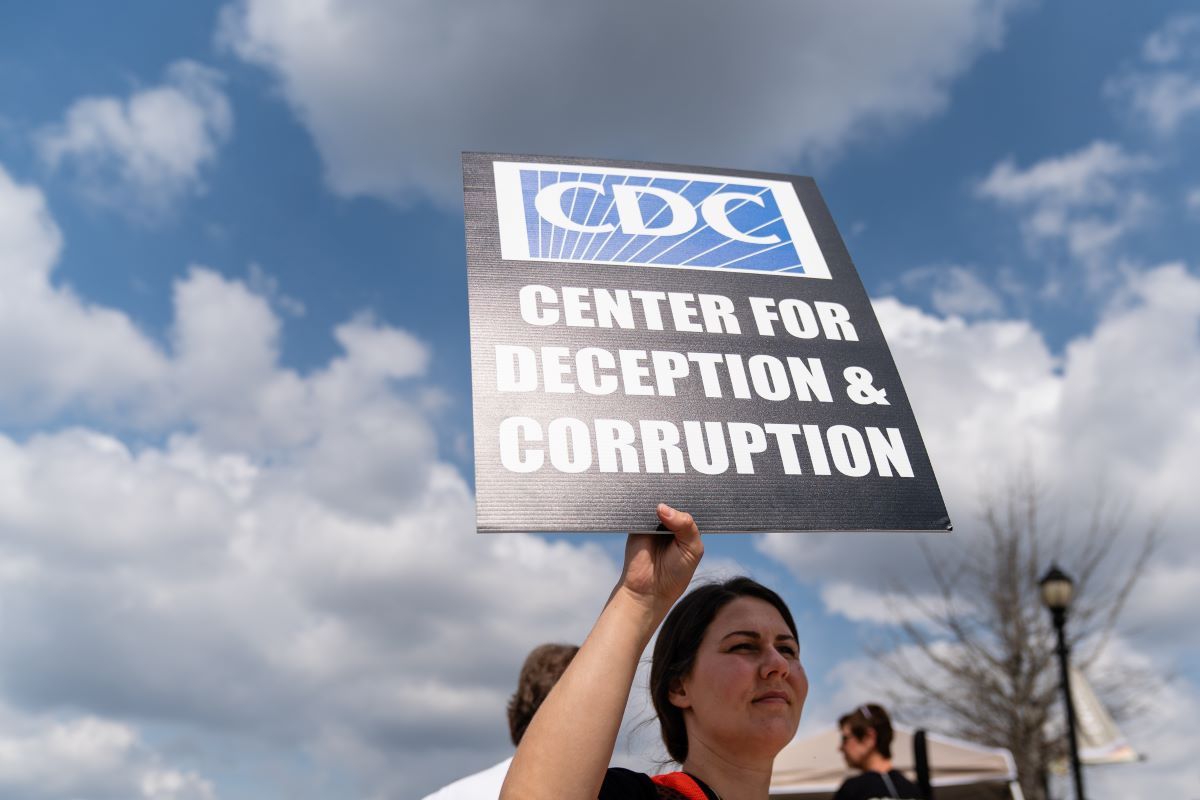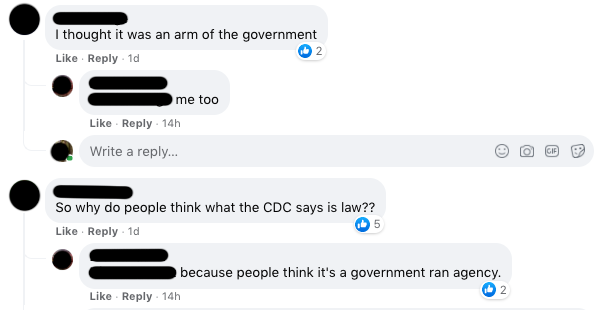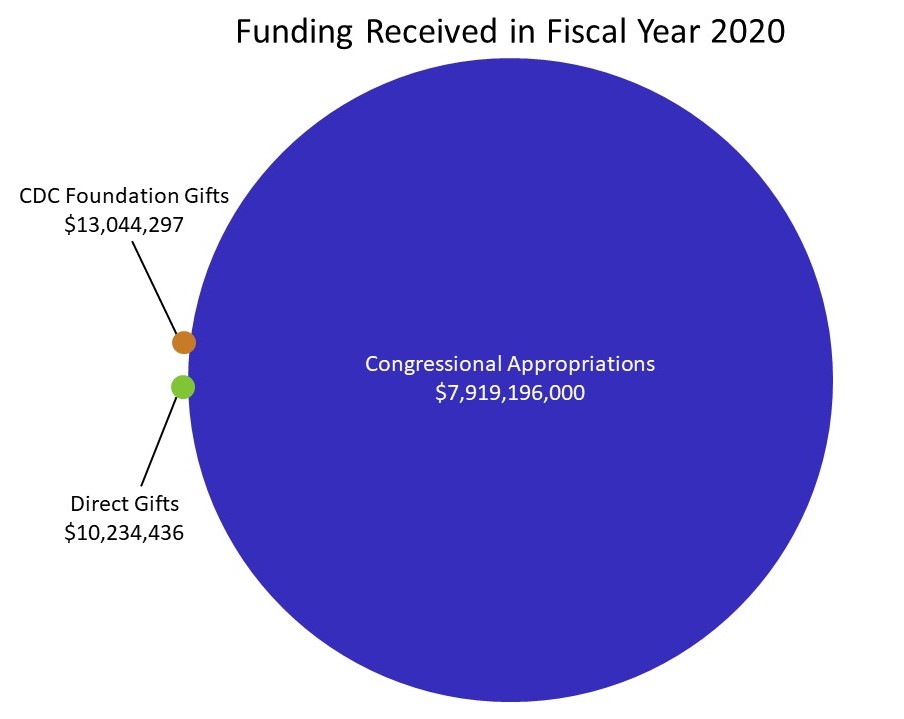While there are legitimate concerns about the potential for conflicts of interest between corporations donating to the CDC directly and indirectly, the author of a viral claim confuses a government agency (the CDC) with an independent 501(c)(3) public charity (the CDC Foundation). The Foundation is independent of the U.S. government and the former's contributions to the CDC make up a proportionally small amount of its overall budget.
Since November 2020, an identically worded bit of text alleging that the U.S. Centers for Disease Control and Prevention (CDC) "is a private nonprofit corporation" has been shared across multiple social media platforms. The claim has its origins on the website Armstrong Economics — which sells a variety of self-published conspiracy books by the titular Martin Armstrong — and would become a well-shared bit of copy-and-paste "copypasta," reproduced in part below:
Did you know the CDC is a private nonprofit corporation? [...]
The CDC is quasi-government under the Department of Health and Human Services which strangely has sources of funding that are predicated on the fact that it also has a private 501(c)(3) public charity, like the Clinton Foundation.
The CDC Foundation receives charitable contributions and philanthropic grants from individuals, foundations, corporations, universities, NGOs and other organizations to advance the work of the Centers for Disease Control and Prevention.
This is NOT a government-funded organization. It is not exclusively a government-funded [sic] – very curious.
Natural News, which boasts a massive audience of conspiracy theorists, republished it in December 2020. At the time of this writing, versions of this copypasta still creep up on various social media platforms. On May 3, 2021, a Facebook account named The Daily Callout published it along with a picture of purported CDC funding sources. Commenters to that post were evidently confused:
The allegations leveled against the CDC are not all that coherent in these posts. The copypasta suggests the CDC is both a non-profit and a "quasi-government" agency. Further, those issues are tangled up in the separate issue of corporate donations to the CDC. The title of the post, however, provides Snopes with a clearly stated contention: "Did you know the CDC is a private nonprofit corporation?" You most likely did not know this, because it is, in fact, not true.
The CDC is a federal agency housed in the U.S. Department of Health and Human Services (HHS). The confusion stems from the fact that, in 1992, Congress mandated the creation of a non-profit foundation — the CDC Foundation — that would "not be an agency or instrumentality of the Federal Government" and whose purpose would be "to support and carry out activities for the prevention and control of diseases, disorders, injuries, and disabilities, and for promotion of public health." As part of that goal, the foundation has an endowment and accepts charitable gifts from a variety of entities, including corporations, which are forwarded to the CDC to support specific initiatives.
"The government has unique capacities as well as limitations. The same is true for the private and philanthropic sectors," the CDC Foundation argues on its website. "We believe that people, groups and organizations have greater positive impact and can accomplish more collectively than individually." Funds raised by the CDC foundation are donated to various programs and initiatives within the CDC.
The CDC Foundation is one of two ways corporations can legally provide funds to the CDC. Donations to the CDC foundation are an indirect route as, by law, "officers, employees, and members of the board of the Foundation shall not be officers or employees of the Federal Government." Direct gifts by corporations to the CDC are also allowed under a portion of the U.S. Code that authorizes the secretary of HHS "to accept on behalf of the United States gifts made ... for the benefit of the Service or for the carrying out of any of its functions."
For both direct gifts to the CDC and gifts made via the CDC Foundation, conditional funding is allowed so long as those requirements are not, as outlined in CDC policy documents:
- Illegal
- Contrary to public policy
- Unreasonable to administer
- Contrary to generally accepted public standards
- An actual conflict of interest
- An apparent conflict of interest to a reasonable person
The acceptance of corporate donations earmarked for specific causes — both to the CDC Foundation and to the CDC itself — have caused apparent conflicts of interest. In 2015, the medical journal BMJ published an editorial outlining several examples of potential conflicts, including these examples:
In 2010, the CDC, in conjunction with the CDC Foundation, formed the Viral Hepatitis Action Coalition, which supports research and promotes expanded testing and treatment of hepatitis C in the United States and globally. Industry has donated over $26m to the coalition through the CDC Foundation since 2010. Corporate members of the coalition include Abbott Laboratories, AbbVie, Gilead, Janssen, Merck, OraSure Technologies, Quest Diagnostics, and Siemens—each of which produces products to test for or treat hepatitis C infection. [...]
In 2012, [a company named] Genentech earmarked $600,000 in donations to the CDC Foundation for CDC’s efforts to promote expanded testing and treatment of viral hepatitis. Genentech and its parent company, Roche, manufacture test kits and treatments for hepatitis C.
The CDC argues that it has policies in place to prevent such conflicts. Its website states that "when we engage with the private sector … we maintain our scientific integrity by participating in a gift review process that is rigorous and transparent. CDC’s gift acceptance policy requires a comprehensive gift review prior to accepting a gift. This includes CDC Foundation (CDCF) gifts and gifts given directly to [the] CDC, whether they are monetary or non-monetary." These processes have been refined and standardized several times since 2014.
While the issue of potential corporate influence over public health policy merits scrutiny, it is also important to consider the scale of private funding compared to the overall congressionally appropriated budget of the CDC. In the 2020 fiscal year, the CDC received $13 million in conditional gifts from the CDC Foundation and $10 million in conditional and unconditional direct contributions from the private sector. This is a drop in the bucket compared to the nearly $8 billion in funding the CDC receives from Congress:
Even from a rhetorical standpoint it would be a stretch to argue the CDC proportionally is awash in corporate funding. Narrowly speaking, however, the assertion that the CDC is a non-profit, non-government organization is incorrect because that claim conflates the CDC (a federal agency) and the CDC Foundation (a 501(c)(3) charity). As such, the claim is "False."



